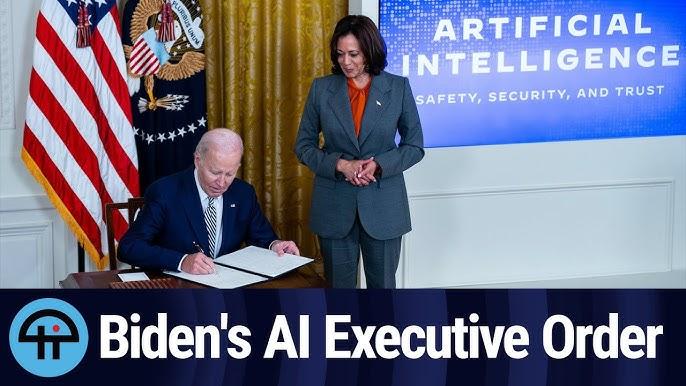Executive Order Shakes Up AI Industry

**What the White House’s Executive Order on AI Means for the Future of Marketing**
In October 2023, the White House issued a groundbreaking executive order on artificial intelligence (AI), setting the stage for the regulation, development, and ethical use of AI technologies in the United States. This executive order has far-reaching implications, impacting industries from healthcare to defense and, crucially, marketing. As AI becomes a more prominent tool in marketing strategies, the new regulations are poised to reshape how businesses leverage AI for customer engagement, advertising, data collection, and decision-making.
### 1. **Ensuring Ethical Use of AI in Marketing**
One of the most important aspects of the executive order is the emphasis on the **ethical use of AI**. As AI continues to advance, the marketing industry has increasingly adopted it to automate tasks such as content creation, customer segmentation, personalized advertising, and predictive analytics. While these tools offer immense advantages, there are growing concerns about privacy, data security, and bias in AI algorithms.
The White House’s order places significant focus on addressing these ethical concerns. It requires that companies and organizations using AI must adhere to strict guidelines ensuring that AI tools do not perpetuate bias or violate consumer rights. For marketers, this means that AI-powered campaigns and tools will need to be more transparent in how they handle data and target customers. Marketers will also have to ensure that their AI systems are fair, explainable, and free from unintended biases, which could have legal and reputational consequences if not properly managed.
This focus on ethics will likely encourage brands to adopt **responsible AI practices**, ensuring that their use of AI is both effective and ethical. The scrutiny on AI ethics could also lead to more transparent communication with consumers about how their data is being used, helping build trust and potentially offering a competitive advantage to companies that prioritize responsible AI use.
### 2. **Increased Regulation on Data Privacy**
Data is the backbone of AI in marketing, powering everything from personalized recommendations to targeted advertising. However, the executive order places new emphasis on **data privacy protections**, a response to rising consumer concerns about how their personal information is collected, stored, and used by companies.
For marketers, this means stricter rules around **data collection and usage**. AI-driven marketing strategies rely heavily on user data to personalize content and predict consumer behavior. Moving forward, businesses will need to ensure that their data collection practices are compliant with the new privacy regulations outlined in the executive order. This might mean investing in more robust consent mechanisms, anonymizing data more effectively, or reducing reliance on third-party data altogether.
The new regulations may also prompt businesses to explore alternative marketing strategies that don’t rely as heavily on personal data, such as contextual advertising or first-party data strategies, where businesses collect data directly from customers with their explicit consent. Marketers who adapt to these changes by prioritizing privacy will likely win consumer trust in an era of growing digital privacy concerns.
### 3. **Innovation and Competitiveness in AI Marketing Tools**
While the executive order introduces regulatory oversight, it also aims to **spur innovation in AI**. The White House has committed to fostering the development of cutting-edge AI technologies while ensuring that they are used responsibly. This move is a signal to businesses and tech companies that AI will remain a crucial component of the U.S. economy, and that innovation in this space will continue to be a priority.
For marketers, this means access to more advanced AI tools in the coming years. The order encourages the responsible development of AI-powered solutions, which could lead to improvements in areas like **content creation, customer service automation, and predictive analytics**. AI tools that can generate high-quality content, anticipate consumer needs, and create personalized experiences at scale will become even more powerful, providing marketers with opportunities to engage audiences more effectively.
Additionally, as the government supports AI innovation, we can expect **smaller businesses** to have greater access to sophisticated AI marketing tools that were once only available to large enterprises. This democratization of AI technology will allow businesses of all sizes to compete on a more level playing field, potentially leading to more creativity and innovation in the marketing space.
### 4. **Adapting to Evolving AI Marketing Standards**
The executive order is expected to introduce evolving **AI standards and best practices**, which will shape how marketers use AI tools in the future. As these standards are established, businesses will need to stay up-to-date with compliance requirements and adjust their marketing strategies accordingly. This might involve working closely with AI developers and legal teams to ensure that AI-powered marketing initiatives meet new regulations and ethical standards.
Companies that invest in understanding and adapting to these standards early will have a strategic advantage. Those who fail to comply may face legal risks or damage to their reputation if their AI practices are found to be unethical or non-compliant.
### Conclusion
The White House’s executive order on AI marks a significant shift in how AI technologies will be developed, regulated, and deployed across industries, including marketing. By prioritizing ethical AI use, enhancing data privacy protections, fostering innovation, and setting new standards, the order challenges marketers to rethink their strategies.
The businesses that succeed in this new era will be those that embrace responsible AI, prioritize transparency, and stay adaptable as the AI landscape continues to evolve. As AI reshapes the future of marketing, companies that align with these new regulations will be better positioned to build trust with consumers and harness the full potential of AI-driven marketing strategies.
Comments